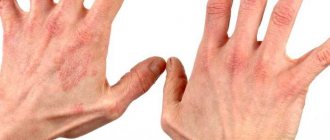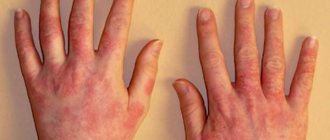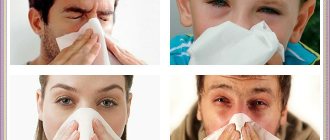Fulfilling military duty is the responsibility of every man of military age, from which not only certain family circumstances, but also serious illnesses can exempt him, but whether allergic reactions are included in this list and whether they are accepted into the army with allergies is a question that often takes a young man by surprise.
Many factors can cause negative reactions of the immune system: food, house dust, pollen, sun, cold, medications and chemicals. For some people this manifests itself from time to time, for others almost constantly, for others it occurs seasonally, during the flowering of various plants. Most often, people living in densely populated cities and in environments with unfavorable ecology are susceptible to allergies. According to statistics, every tenth person has this problem.
We bring to your attention an introductory material that will discuss in detail all types of allergic reactions and their compliance with the categories that determine suitability or unsuitability for military service.
Will people with allergies be accepted into the army in 2020?
Federal Law No. 53-FZ “On Military Duty and Military Service” defines categories of citizens who are not subject to conscription into the army:
• Recognized as partially fit for military service due to health reasons. • Those serving sentences in the form of compulsory labor, correctional labor, restriction of freedom, arrest or imprisonment. • Having an unexpunged or outstanding conviction for committing a crime; • In respect of which an inquiry or preliminary investigation is underway or a criminal case in respect of which has been transferred to court. • Citizens declared unfit for military service due to health reasons.
The schedule of illnesses, approved by Decree of the Government of the Russian Federation No. 565, determines the fitness category of a conscript in the presence of various diseases. The Schedule of Diseases does not contain specific provisions on the presence of allergies, but article No. 84 is decisive:
Poisoning with drugs, medications and biological substances, toxic effects of substances, mainly for non-medical purposes; exposure to external causes (radiation, low, high temperatures and light, increased air or water pressure and other external causes):
• With significant impairment of functions – category “D” (1st, 2nd and 3rd columns). • With moderate dysfunction – category “B” (1st and 2nd columns), “B”/“C” (3rd column). • With minor impairment of functions – category “B” (1st and 2nd columns), “B” (3rd column).
Where:
Category B - fit for military service with certain restrictions. Category B - limited suitability for military service. Category D - not fit for military service.
Persons suffering from a food allergy with clinical manifestations (confirmed by examination in a hospital setting) to basic food products according to military ration standards are examined under point “b”. For other allergic diseases (urticaria, hay fever, allergic rhinitis, dermatitis, etc.), the examination is carried out according to the relevant items of the disease schedule, depending on the state of the functions of the affected organ or system.
After acute poisoning, toxic-allergic effects, acute allergic diseases (anaphylactic shock, serum sickness, Lyell's syndrome, Stevens-Johnson syndrome) and the effects of other external causes, the category of fitness for military service is determined depending on the outcome of the diseases and the functions of the affected organs or systems according to the relevant articles of the disease schedule.
A person liable for military service undergoes military service if he has the following types of allergies:
• Pollen. • Animal fur. • Pollen. • Dust. • Insect bites. • Chemical components.
If a conscript suffers from food allergies to foods that belong to the soldier’s diet, for example, meat, potatoes, bread, etc., then he receives an “unfit” category and is exempt from military service. It is worth noting that not every food allergy is a clear possibility of obtaining an exemption from military service. For example, allergies to foods such as chocolate, nuts, citrus fruits, pineapples, coconuts or bananas do not qualify for military service exemption.
There is a fairly common allergy called hay fever. This type of allergy is seasonal, manifests itself in pollen and has the following symptoms:
• Irritability • Lethargy • Cough • Runny nose • Conjunctivitis
Since hay fever has smoothed symptoms that do not have serious health consequences, the person liable for military service is determined to be in fitness category “B” and sent to serve in the army. But there are exceptions on the basis of which a conscript is unfit for military service. For example, if hay fever subsequently causes the development of bronchial asthma. A similar disease is described in article No. 52 of the Schedule of Diseases:
In the presence of bronchial asthma, confirmed by medical documents on treatment in inpatient conditions and requests for medical help, a conclusion on the category of fitness for military service of citizens can be made without examination in inpatient conditions. In the absence of documented evidence of a medical history, pharmacological and (or) physical bronchoprovocation tests are verification tests for the diagnosis of bronchial asthma in stable remission.
In this case, the determination of a conscript’s suitability is characterized not by an allergic disease, but by the presence of bronchial asthma. If a medical report provided by the conscript himself or obtained through an additional examination confirms the diagnosis of bronchial asthma, then the conscript is exempt from military service and receives a fitness category of “B” or “D” based on the clinical picture.
Thus, the question of suitability for military service is determined by the clinical picture of the disease. If the allergy is characterized by a standard set of symptoms (runny nose, sneezing, etc.), which does not have serious consequences for health, then the conscript will be sent to serve with 100% probability. If the clinical picture is accompanied by serious consequences, for example, swelling of the mucous membranes, skin or other integuments, then the conscript has the opportunity to receive a fitness category of “B” or “D”. Quincke's edema can be caused by various allergic reactions - food, flowers, drugs, etc.
In order to obtain the most objective conclusion from the draft commission, a citizen liable for military service must provide all available medical documents indicating the presence of the disease and the degree of its consequences. Based on the data received, the medical commission determines the possibility of serving in the army depending on:
• General health of the conscript. • Survey conclusions. • Presence of complications and their degree. • Other existing diseases.
If the allergy is of moderate severity, then, as a rule, the draft commission grants a deferment until the next medical examination. If the draft commission has doubts based on the medical documents received from the conscript or there is no medical data on the full picture of the disease, the conscript is issued a referral for an additional examination to obtain data on the state of health.
REFERENCE.
The military commission primarily pays attention not to the disease itself, but to the degree of existing complications that may create difficulties for serving in the army.
Bronchial asthma: causes of the disease
- House dust. It contains tiny particles of dead skin cells, chemicals, plant pollen, animal hair, as well as tiny microorganisms and dust mites, which are strong allergens that can cause bronchial asthma.
- Poor environmental conditions. Residents of administrative centers, large cities and industrial areas are more susceptible to the formation of bronchial asthma, since they have increased levels of air pollution from exhaust gases and various harmful fumes from industries. Also, the occurrence of asthma can be caused by a climate that is too humid and too cold.
- Professional activity. People who, due to their professional activities, constantly inhale harmful volatile substances and their smallest particles (construction workers, office and warehouse workers, beauty salon workers, employees of chemical and metallurgical enterprises) are susceptible to the occurrence of bronchial asthma.
- Smoking (passive or active). Tobacco smoke and various smoking mixtures negatively affect the walls of the bronchi, causing their pathological changes and leading to the development of bronchitis, bronchial asthma or lung cancer.

- Household chemicals and cosmetics. The substances included in their composition can cause coughing attacks, choking and asthmatic disease.
- Diseases of the respiratory tract. The presence of tracheitis, bronchitis or pneumonia, as well as the presence of an infectious process in the respiratory system of the body, can cause a chronic inflammatory process in the bronchial tree and lead to an obstructive process in the bronchi.
- Medicines. The use of certain medications, in particular non-steroidal anti-inflammatory drugs (Aspirin, Acetylsalicylic acid) can lead to disturbances in the functioning of the respiratory system and the formation of asthmatic attacks.
- Stress and neuroses. Constant mental tension, stress, emotional exhaustion lead to disturbances in the functioning of the body's immune system, the development of hypersensitivity and hyperreactivity of the bronchial tree of the respiratory system, allergies and the inflammatory process in the bronchi.
- Food products. A complete, balanced and proper diet is the key to the normal functioning of the organs and organ systems of the body and its health. Conversely, consuming large quantities of unhealthy foods (smoked meats, canned food, processed foods, spicy and salty foods, alcohol), as well as foods high in allergens (nuts, honey, seafood, chicken eggs, cow's milk), can cause the development of disorders in the functioning of body systems, in particular the immune and respiratory systems.
- Presence of genetic predisposition. Any disease that is based on an allergic reaction is of a hereditary nature in the process of occurrence, that is, it is transmitted at the genetic level from its closest relatives. Hereditary bronchial asthma is called atopic asthma.
- Disruptions in the normal functioning of the autonomic nervous system.
- Disturbances in the functioning of the body's endocrine and immune systems.
Types of allergies and military service

The following types of allergies are distinguished:
• Allergic rhinitis. • Allergic conjunctivitis. • Hay fever. • Food allergies. • Drug allergies and more.
A medical examination is based on the type of allergy and the course of the disease. The medical commission makes an opinion based on the data received on the conscript’s health condition and the Schedule of Diseases.
How does the disease manifest?
- shortness of breath after performing even minor physical activity;
- suffocation;
- nasal congestion;
- coughing attacks (initially dry, later with thick sputum);
- rapid shallow breathing;
- difficulty during exhalation;
- wheezing in the lungs;
- hives;
- orthopnea.
- deterioration in general health;
- feeling unwell;
- the occurrence of tachycardia;
- whistling and wheezing sounds during breathing;
- formation of headaches, dizziness;
- pain in the lower chest area.

- increase in heart size;
- acrocyanosis and diffuse bluishness of the skin;
- weakening of breathing;
- increase in chest size;
- drowsiness;
- pathological changes in the nail plates;
- dermatitis;
- eczema;
- psoriasis;
- allergic rhinitis.
Do they take into the army with allergic rhinitis and conjunctivitis?
Allergic rhinitis is an inflammation of the mucous membrane of the nasal surface, which is accompanied by the following symptoms:
• Discharge from the nasal passage. • Redness and watery eyes. • Laryngeal swelling and cough.
Allergic rhinitis is similar to regular rhinitis, but is caused by a specific allergen. The conscript must contact a medical facility for a diagnosis and identification of the type of allergic rhinitis. When undergoing a medical examination for military service, the determining factors are the presence/absence of breathing problems, the consequences of the inflammatory process, as well as the presence of concomitant diseases.
Allergic conjunctivitis is an inflammation of the mucous membrane of the surface of the eyes. Symptoms of the disease appear due to a specific allergen and can occur in acute or chronic illness. Allergic conjunctivitis can be complicated by a bacterial infection. The symptoms include the following:
• Tearing. • Itching and swelling in the eye area. • Photosensitivity.
The course of the disease may also be accompanied by dermatitis and nasal discharge.
REFERENCE.
Suitability for the army is determined by the severity of the disease, the results of treatment, the frequency of relapses and the duration of remissions.
Course of the disease in children
The incidence of bronchial asthma in children has been increasing alarmingly over the past 20 years, debuting at an increasingly early age. In young patients, asthma is of an allergic nature, accompanied by an inflammatory process in the bronchi and a change in their reactivity. Typical symptoms:
· episodes of suffocation;
· paroxysmal cough;
· wheezing;
· expiratory (difficulty breathing) shortness of breath.
Treatment protocols suggest eliminating contact with allergens, using aerosol bronchodilators, anti-inflammatory and antihistamines, and using specific immunotherapy.
Do people with allergies to flowers, pollen, dust and wool join the army?

Hay fever is a seasonal allergy and occurs in the spring/summer. Such an allergy is not a reason to be unfit for military service. As a last resort, a conscript can perform military service in an area where the presence of plants that cause allergies is excluded. If a conscript has hay fever, he is considered unfit only if the allergy has serious health consequences. In this case, the disease picture is determined by the accompanying symptoms based on the Schedule of Diseases.
If a person liable for military service has an allergic reaction to dust or wool, then such a circumstance will not be grounds for receiving a military ID, unless there are serious health consequences.
Can people with food allergies be drafted into the army?
When undergoing an examination, the doctor’s main task is to make a correct diagnosis, since food allergies can be easily confused with food intolerance or aversion to food.
A conscript is unfit for military service if the following factors are present:
• Presence of severe allergy symptoms. • Confirmation of diagnosis in an inpatient setting. • Manifestation of allergies to basic food products established by military allowances.
If these factors are present, the conscript will receive fitness category “B” or “C”.
List of food products for soldiers in the Russian army
Decree of the Government of the Russian Federation dated December 29, 2007 No. 946 defines a list of products that are used for the military nutrition system:
• Bread made from a mixture of first-grade rye and wheat flour. • White bread made from first grade wheat flour. • First grade wheat flour. • Various cereals and legumes. • Premium quality pasta. • Meat. • Gutted fish without heads. • Vegetable oil. • Cow butter. • Cow's milk. • Chicken egg. • Hard rennet cheese. • Tea. • Natural instant coffee. • Potato. • Cabbage. • Beet. • Carrot. • Onion. • Cucumbers, tomatoes, pumpkin, zucchini. • Dried fruits - raisins, dried apricots, prunes. • Fruit and berry juices.
Allergy to fish and milk
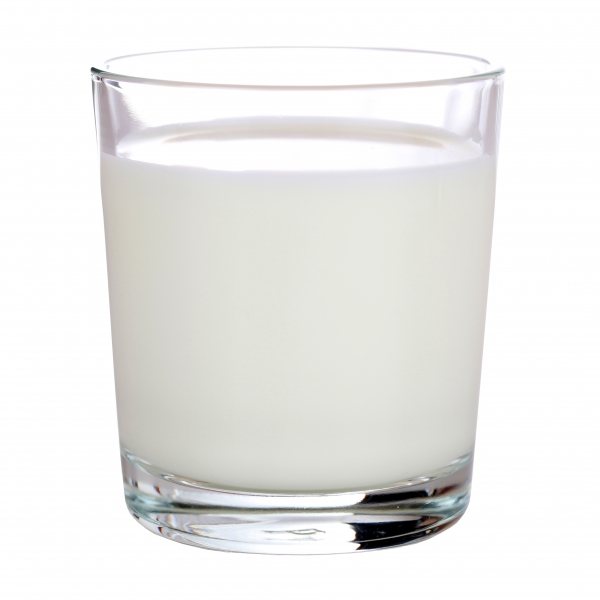
If there are severe symptoms of an allergy to fish and/or milk, which were confirmed in a hospital setting, the conscript receives a deferment or complete exemption from military service.
The army and allergies to cold and insect bites
Allergy to cold is characterized by the following symptoms:
• Skin rash. • Redness and itching. • Edema.
If the allergy is not characterized by serious consequences and occurs in a mild form, the medical commission will determine the “suitable” category for the conscript. If there is a severe form, the military commission will be guided by the Schedule of Diseases to determine fitness.
An allergy to insect bites can be characterized by swelling, dermatitis and even anaphylactic shock. But the Schedule of Diseases does not define this type of allergy as a reason for exemption from military service. In this case, the military registration and enlistment office will send the recruit to the navy for service, where the presence of insects is minimized.
You cannot remain silent about your illness!
In any case, even if a young man really wants to go to serve, he should take into account one important fact. If he had asthma in the past, but it no longer reminds him of itself for many years, he should not consider himself healed
After all, attacks can resume at any moment, and physical activity, like a change of environment, may well play the role of a catalyst.
However, it is one thing to understand this on your own, and another to prove to the military registration and enlistment office that the disease is present, and serving is life-threatening. After all, if there are no necessary papers and other evidence, then wheezing may be considered residual after some kind of cold. And complaints are simply an attempt to get rid of the need to serve.
Expert opinion Antonov Viktor Sergeevich Practicing lawyer with 8 years of experience. Specialization: military law. Recognized legal expert.
If we are talking about a moderately severe disease, a test can be considered as evidence. It is very simple - a person is asked to go for a run.
If attacks are provoked precisely by physical activity, then such evidence will be quite comprehensive. After all, the attack will begin either during the run, or shortly after it.
However, if attacks begin for other reasons, then other tests are required.
The army and allergies to medications and metals
Drug intolerance is not a reason for exemption from military service - only when a conscript is admitted to a military hospital during the period of service will this factor be considered more closely.
During a medical examination, the military commission pays attention only to those medicinal allergens that belong to the main list of military medicine. If these allergens are present, the conscript has the opportunity to receive an exemption from the army, since military medicine will not be able to provide appropriate assistance taking into account allergies.
REFERENCE.
During the examination, medical reports confirming the allergen and the body’s reaction to this allergen are taken into account.
Metal allergy refers to contact dermatitis and is a “recruiting” disease. The exception is cases when dermatitis becomes chronic and has a pronounced character.
Classification of bronchial asthma according to the severity of the disease
- Intermittent asthma. This form of asthma is characterized by short attacks that occur no more than once every 7 days, with night attacks occurring no more than twice a month. Indicators of forced expiratory volume and peak expiratory flow exceed 8/10 of the norm. The spread of peak expiratory flow is less than 2/10.
- Mild persistent asthma. With this form of asthma, attacks occur more often than once every 7 days, but not daily. The number of night attacks per month increases to two or three. There is worsening sleep and decreased physical activity. Indicators of forced expiratory volume and peak expiratory flow exceed 8/10 of the norm. The range of peak expiratory flow is from 2/10 to 3/10.
- Persistent asthma of moderate severity. The presence of daily attacks. Night attacks occur more often than once every 7 days. Indicators of forced expiratory volume and peak expiratory flow are 6/10 - 8/10 of normal. The spread of peak expiratory flow is 3/10. There is sleep disturbance and limitation of physical activity.
- Severe persistent asthma. Characterized by daily daytime attacks and several nighttime attacks per week. Accompanied by insomnia and significant limitation of physical activity. Forced expiratory volume and peak expiratory flow rates are 6/10 of normal. The spread of peak expiratory flow is more than 3/10.
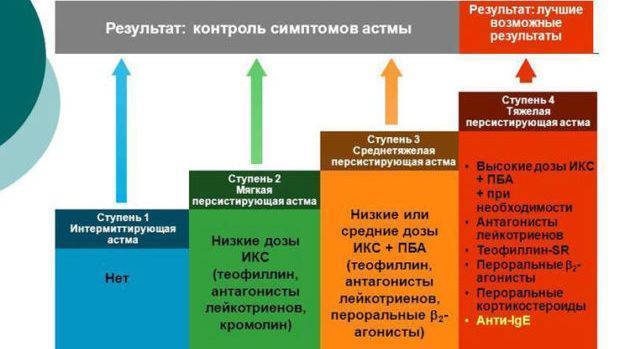
Features of the service of a soldier with allergies
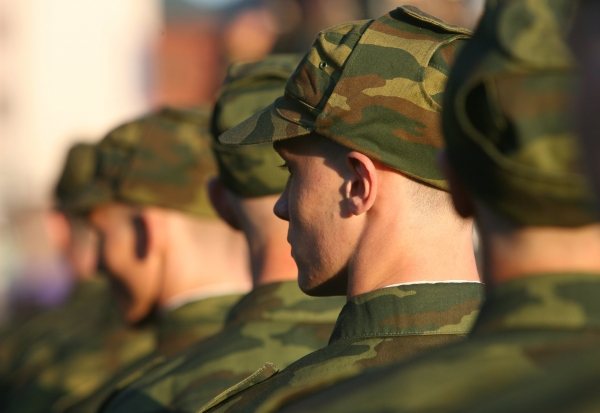
A soldier who has an allergy and is called up to serve in the army undergoes it on a general basis. An exception may be factors related to allergies. For example, if there is an allergy to pollen, a conscript serves in an area where there are no blooms of allergens. If a recruit is allergic to insect stings, a recruit may be assigned to the Navy to reduce the possibility of allergic reactions.
What to do if an allergy appears during service
If pronounced symptoms and/or severe allergic complications occur, the serviceman should be sent for re-examination, which will establish the clinical picture. The military medical commission determines the advisability of further military service based on the Schedule of Diseases. If the clinical picture contains factors that impede further service, the serviceman will be discharged and subsequently receive a military ID.
REFERENCE.
A soldier must take the occurrence of allergic manifestations seriously, since failure to timely identify the causes of allergies and block them can have a detrimental effect on health.
Publication date 06/13/2019

